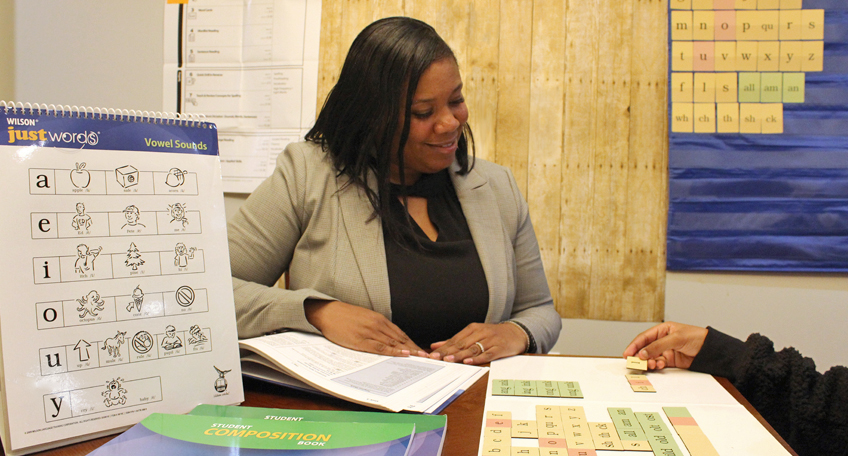Growing up, Lakesha Costello felt destined to become a teacher. But it was intuition and initiative that led her to discover the “missing piece” of reading instruction that she and her struggling readers were lacking.
A graduate course on learning disabilities piqued her interest in dyslexia and evidence-based, explicit, structured literacy instruction. Tapping into the in-person and online professional learning courses offered through Wilson Language Training® and two Wilson® Accredited Partners—Woodlynde School/Literacy Institute in Strafford, PA, and AIM Academy’s Institute for Learning and Research in Conshohocken, PA—Lakesha began building the knowledge and skills needed to help her at-risk high school students.
Now in her fifth year as a reading specialist in the school district she attended as a child, Lakesha teaches Just Words® and the Wilson Reading System®. She credits her Wilson® Credentialed Trainers’ explicit instruction, guidance, coaching, and mentoring with her proficiency teaching structured literacy curriculum, and is proud of her students for their determination and accomplishments.
I knew at a young age that I was born to be an educator. I would line up my stuffed animals and younger siblings to play school. As the oldest child, I took pride teaching them what I had learned that day.
After earning my bachelor’s degree, my first teaching job was at a residential treatment facility as an emotional support teacher. It was a challenging yet rewarding position. I noticed that many of the students were well below grade level in reading. There were gaps in their learning, and it was evident that they had missed some basic foundational skills.
This troubled me and led me to learn more about reading. I decided to pursue my master’s degree in education with a reading specialist certification. One of my classes addressed reading disabilities and related support programs. I was assigned to research dyslexia, and the more I read, the more interested I became. I found many similarities between what I saw in my students and what I was studying.
As I researched programs, I came across WRS and decided to pursue Level I Certification. I signed up for the WRS Introductory Course at Woodlynde School, where I met Penny Moldolfsky, and knew that if I could be as effective a teacher as Penny, I could help my students make real progress.
On the first day of training, I thought about the years I had told students to “sound it out” or “look it up” and felt terrible. I remembered being in the classroom as a first-year teacher when a student asked me how to spell a word. Instead of spelling the word for him, I told him to look it up in the dictionary. This had to be the correct answer. After all, that’s what I had been told to do when I couldn’t spell a word. Plus, as new teachers, we were encouraged to help students think for themselves.
The student pulled a dictionary off the shelf and searched for the word “cyclone.” Convinced I had helped him, I moved on to another lesson. Well into the next period, I realized he was still looking in the dictionary and not paying attention. I walked over to redirect him and saw him vigorously looking through the “si” section. I ended up spelling the word for him.
The WRS Introductory Course helped me realize that I hadn’t helped this student. He, like most of the students in my class, was years behind in reading and lacked the skills to consider spelling options. More importantly, I didn’t have the skills to help him figure out the word. Sure, I knew how to spell the word, but I had no idea how to teach him to spell the word.
Throughout my WRS training, I learned about the science of reading and how the brain works while learning to read. In particular, I learned the importance of phonemic awareness skills and ensuring that students recognize the sounds represented by the letters of the alphabet. I also learned that taking time to teach language rules and moving forward only when students achieve mastery of a concept are key to strong reading instruction.
My instructors were patient and taught me how to best meet the diverse needs of my students. They encouraged me and challenged me. While completing my WRS Level I Certification with Dr. Ann Appolloni, she emphasized the importance of following the program with fidelity, and I credit much of my students’ success to this advice.
After successfully earning my WRS Level I Certification and Wilson® Dyslexia Practitioner (W.D.P.) professional credential, I received Just Words training. Last spring, I completed the WRS Steps 7-12 practicum with Susan Patteson and a determined student whose baseline Lexile® score jumped from 640 to 847 by the end of the school year. I’m currently working on completing my group practicum with Kristina McGuirk. I anticipate receiving my WRS Level II Certification and accompanying Wilson® Dyslexia Therapist (W.D.T.) credential this spring.
I’ve been teaching WRS and Just Words since 2016. As a high school reading specialist, I see students who have given up on reading because they’ve been unsuccessful in the past. However, thanks to my training, I now have the tools to restore their hope and encourage them to keep trying.
It’s so rewarding to observe their progress. For many of them, Just Words and WRS are the missing pieces of the puzzle because they gain confidence and the desire to become better readers and spellers in all subject areas.

